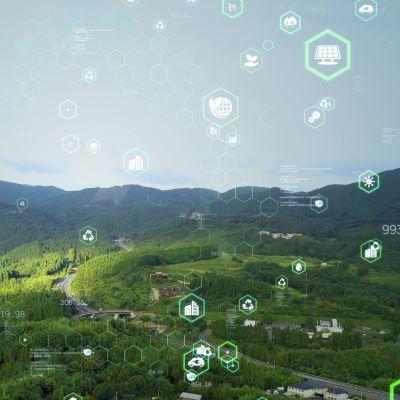
As the world grapples with the urgent need to combat climate change and resource depletion, a new breed of business is emerging. These organizations will be sustainable to the core—not just green but deeply green, with sustainability encoded in their DNA.
Rather than just tending to the sustainability of their internal operations, deeply green businesses will collaborate in entirely new ways across their value chains—coordinating their vision, actions and decisions with other players and partners in their ecosystem. At the same time, they’ll create products and offerings that go beyond mitigating environmental issues, to helping to solve them. Operating in this manner, these businesses will not only shrink their own environmental footprint and those of their stakeholders—they’ll also discover entirely new ways to secure resilient growth.
Based on the findings of a recent survey of 3,000 executives across every market and sector by Oxford Economics and Cognizant, the study ‘Deep Green: how data, technology and collaboration will drive the next phase of sustainability in business’ puts forward five recommendations for how leading enterprises can out-perform their markets with enduring and differentiating growth by embedding sustainability at their core:
- Boost sustainability investments to realize full business value: The research has revealed strong recognition of the financial benefits of sustainability initiatives. The number of respondents who expect their sustainability efforts to drive stronger financial performance doubles between now and 2025 (from 31% to 65%). Over half (57%) ranked improved business performance as a top-3 driver for sustainability efforts, a close second to their belief in the moral imperative of doing social good (59%).
- Elevate your internal sustainability initiatives for even greater return: There is still substantial work to be done on improving the sustainability of internal operations. Sixty-six percent of respondents said they are focused on their internal operations, and the research found that the number one area for sustainability initiatives by far is the broad use of digital tools to make internal operations more energy efficient. By 2025, however, the top sustainability initiatives will require far greater levels of data management and sophisticated analysis. For example, 42% of respondents plan to create virtual simulations (i.e., digital twins) of their operations and physical assets, which will enable them to experiment with more sustainable practices without disruption.
- Expand your sphere of influence, upstream and downstream, to secure greater business benefits and impact: Organizations should use their internal operations work as a platform to broaden the scope of sustainability initiatives externally. Sixty-two percent of respondents say they are currently sourcing assets, products, components and raw materials that require less energy, and the top-rated initiative by 2025 will be to select suppliers that have a ‘net positive impact on the environment’. Businesses should however recognize that these actions don’t take into account the ability to see what’s behind suppliers’ claims, leaving them vulnerable to greenwashing accusations, embarrassing revelations and potential financial regulatory penalties.
- Explore the deeper application of emerging and maturing technologies, and commercially creative ways to deploy them: Over half of respondents (62%) believe that significant technological advancements are needed to achieve net-zero compliance. However, our analysis reveals that the technologies to get there are here. The 5th most implemented technology for sustainability, Intelligent Process Automation, stood out as the most effective technology among respondents. Similarly, just 26% of respondents have implemented blockchain technology, yet those who’ve implemented it are convinced of its effectiveness, bringing it to the number two spot, in line with AI/ML.
- Evolve power structures to allow for necessary shifts in culture and accountability: The report identified a counterproductive balance of power regarding the responsibility and accountability for the success of sustainability initiatives. Respondents cited the top challenges in this area as lack of alignment between different business units and stakeholders, lack of strategic clarity, and a lack of awareness, skills or broader understanding of sustainability—all named by over one-third of respondents. Only 32% of the participants reported incentivizing employees at all levels to improve sustainability in their workplace. However, a significant 71% of the respondents identified incentivization as the most effective method for promoting a cultural shift towards sustainable practices.
“From these findings, we believe that businesses will soon find a path to value beyond ‘business-as-usual’, to new ways of producing goods and services that meet both economic and environmental needs” said Euan Davis, Head of Cognizant Research. “What you do next as a leader is critical. Whatever path you take demands humility, open-mindedness, and a willingness to partner to address the complex and interconnected challenges of the day. It won’t be long before the ideas of “sustainability” and “business” become one and the same, as the two become intertwined.”
